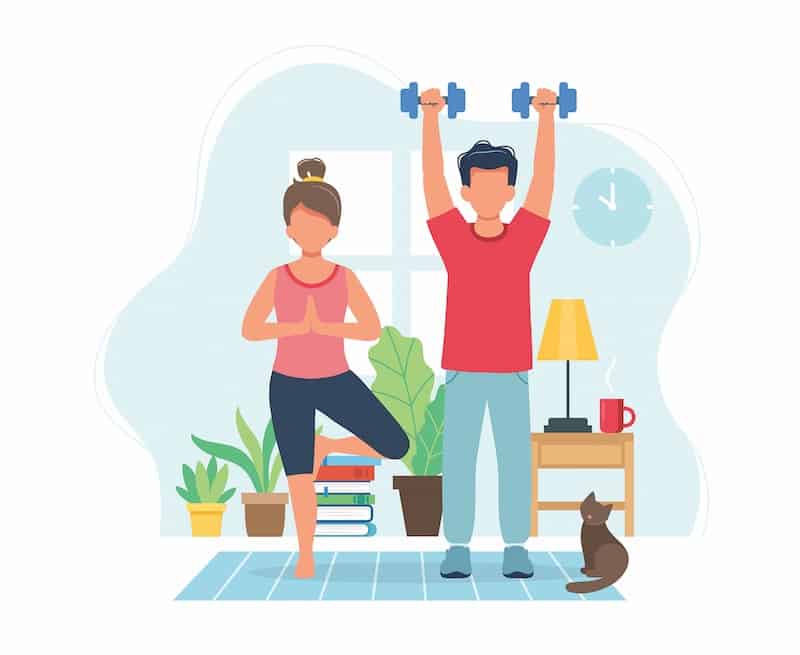And more of the latest sleep news and research

Sleep and exercise are two pillars of health. But how do they work together?
This was the question researchers at University College London and the University of Sydney investigated when they asked 380,055 UK Biobank participants about their physical activity levels and sleep patterns from 2006 to 2010. A follow-up was conducted in May 2020. Participants who had a history of cardiovascular disease, cancer, sleep apnea or high-risk obesity (a BMI of 40 or higher) were excluded from the baseline.
Researchers found that those who had poor sleep and low physical activity were 67% more likely to develop heart disease and 45% more likely to be diagnosed with cancer compared with those who had high activity levels and healthy sleep patterns. However, the effects of poor sleep on mortality were drastically reduced when participants met the World Health Organization’s recommendations for physical activity. WHO guidelines state adults should aim for 150 to 300 minutes of moderate activity or 75-150 minutes of vigorous activity each week.
The study was published online May 25 in the British Journal of Sports Medicine.
5 Sleep Tips From an Olympic Expert

The summer Olympics might be over, but it never hurts to hear from the experts — especially when they’re advocating for good rest.
Neuroscientist Dr. Jeffrey Durmer, employed by USA’s Olympic weightlifting team and chief medical officer of Nox Health, knows a thing or two about using sleep as a component of peak performance.
In a July 26 interview with “Good Morning America,” he noted that athletes’ perceptions about sleep have changed in a positive way. “If you can actually start to build sleep into your training routine, it will support all kinds of resilience, mental resilience, physical resilience, immune resilience … so you can actually perform at your highest level.”
Here are his tips:
- Build a bedtime routine. Set an alarm reminding yourself to start getting ready for bed and take the time to wind down. Do whatever you find relaxing, such as meditation, reading or stretching.
- Cool down. Bringing your core temperature down helps you fall asleep and stay asleep. He suggests taking a warm shower and cooling down quickly, as well as keeping your room cool.
- Kick technology out of your room. Easier said than done, we know, but the light from phones, tablets and TVs makes it harder to fall asleep.
- View sleep as part of your performance. Think of sleep as the first step to a high-performance day tomorrow.
- Pay attention to your sleep habits. If you’re getting enough rest but don’t feel refreshed, it might be time to consult a doctor.
Rest Unlocks Resilience

Resilience — the ability of a person or organization to adjust to or overcome adversity — is valuable. And the key to building resilience is free and available to everyone.
“The answer to less stress, higher resilience, better brain function and improved wellness is seven to nine hours of quality sleep — every night,” wrote Kevin Kruse in a July 30 Forbes article.
Just like adequate rest restores the physical body, quality sleep contributes to improved memory, decision-making, concentration, reasoning, problem-solving, reaction time and alertness. “Without sufficient sleep, our brains can’t process new information and will struggle to recall the information in the future — two functions essential to adaptability and resilience,” he wrote.
Nosh This Before Bed

If you’re feeling a little bit hungry before you hit the hay, this simple snack might hit the spot — walnuts.
Registered dietician Samantha Cassetty recommends walnuts because they not only provide nutrition but also promote good sleep. “Walnuts contain more ALA — an anti-inflammatory omega-3 fatty acid — than any other nut,” she told Elsie Yang for an Aug. 3 article in Well + Good. “Additionally, a serving of walnuts contains 4 grams of protein, 2 grams of fiber and 11% of your daily magnesium requirement. They also supply a considerable amount of antioxidants, such as polyphenols, which have a beneficial effect on your gut health and reduce your risk of chronic disease.”
To aid with sleep, walnuts contain tryptophan, an amino acid that helps create serotonin and melatonin. The magnesium in walnuts and the melatonin they help create are especially helpful for sleep.
“If you think of your brain as having an on/off switch, magnesium is part of the machinery that turns the switch off,” Cassetty said. “This helps you fall asleep; meanwhile, the rise in melatonin levels are making you feel sleepy, too. They work in different ways, but they both facilitate quality sleep.”
Walnuts also are part of a healthy diet, which supports good rest. “A diet that’s high in saturated fat and added sugar but low in fiber has been linked with sleep disturbances,” she said. “On the other hand, a high fiber diet that is lower in sugar and saturated fat may help with deeper, more restorative sleep. On top of supplying nutrients related to better sleep, walnuts fit into this dietary pattern perfectly, so they’re working numerous angles.”
Number Crunching

To adjust sleep schedules in preparation for going back to school, Lynelle Scheeberg, a pediatric sleep psychologist at Connecticut Children’s, recommends waking everyone up 15 minutes earlier every few days.
The Tired Retired

Clocking out of an everyday work schedule could have unintended consequences for the recently retired.
Abandoning a regular wake-up schedule can throw off circadian rhythms, according to a July 30 MarketWatch article.
“Many people 65-plus find that their sleep quality diminishes,” said Brandon Peters, a sleep physician at Virginia Mason Medical Center in Seattle. “You may only need seven or eight hours of sleep, but you may spend nine or 10 hours in bed.”
Other factors that can impact retirees’ sleep include side effects from medication, a less active lifestyle or minor ailments, such as leg cramps.
The first step to getting better sleep is regulating circadian rhythms. “I tell my patients to get 15 minutes of sunlight within 15 minutes of waking,” Peters said. Early exposure to natural light helps reset the body clock.
Second, make exercise a regular part of the day. Maintaining an active lifestyle leads to sounder sleep, the article said.
At night, wind down with a relaxing activity, such as reading or watching a low-drama TV show. “It’s OK to watch television before bed as long as the TV is in a different room from your bedroom,” Peters said. “It’s important to have that time to unwind.”




